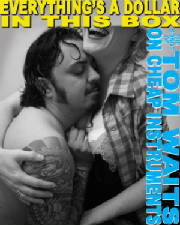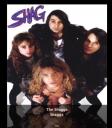Always wanted a tubular fish tank that could encircle a room, maybe even go up stairs, exist underfoot… basically some way to enmesh the meditative qualities of “ambient fish” into my life. Will probably never get my wish, but while I’m waiting, the Chemical Brother’s “Salmon Dance” will have to do.
Category Archives: Cut-Out Bin
When Romantics Collide: Finn, Sorkin, & Dana’s Panties
The final season of The Sopranos is casting a long shadow in my life these days. I know, this is a music site—we’ll get to that. But as I write this, there are merely two episodes left in the greatest television show ever, and I’m pretty deeply engrossed. Anyone familiar with the show knows that music has always played a huge role, and after a recent episode used Van Morrison’s cover of “Comfortably Numb†to set-up maybe the series’ most singularly breathtaking moment, I was ready to dig deep into why the song choice was absolute perfection…
…until I discovered that those crafty Sopranos-deconstructors at Slate beat me to it. (And did a far better job than I ever would have; I mean, the guy brings Hitler’s secret bunker into his analysis—no way I would’ve dug that deep.) But it led me to ask: what is my favorite moment of pop song/TV show symbiosis?
Continue reading When Romantics Collide: Finn, Sorkin, & Dana’s Panties
Goodbye, Ruby Grapefruit
 In an interview I did once with psychedelic guitarist Steve Kimock, I asked him why, when I hear music that isn’t familiar, I often find myself relating it to something I do know. For instance, a song by his then-band Zero had a hook that reminded me of the chorus of a Beatles song. One of his guitar riffs reminded me of Mark Knopfler’s playing on “Money For Nothing.” Zero’s cover of “Baby, Baby” (aka, “Baby, I Love You,” made famous by Aretha Franklin) smacked of a Dead song (“The Love Each Other”).
In an interview I did once with psychedelic guitarist Steve Kimock, I asked him why, when I hear music that isn’t familiar, I often find myself relating it to something I do know. For instance, a song by his then-band Zero had a hook that reminded me of the chorus of a Beatles song. One of his guitar riffs reminded me of Mark Knopfler’s playing on “Money For Nothing.” Zero’s cover of “Baby, Baby” (aka, “Baby, I Love You,” made famous by Aretha Franklin) smacked of a Dead song (“The Love Each Other”).
“Cultural preconditioning” was Kimock’s explanation. He was also talking about our familiarity with western scales and harmonies.
I can’t help thinking there’s something a mite odd about the way my brain will take some string of music fed into and run this frantic search to find even an approximate match in my memory. But then, it’s not just me, is it? In the Onion‘s ’03 classic “I Have An iPod—In My Mind,” the fictional writer touts the superiority of his built-in iPod:
There are no firewire cords or docks to mess with. I just put my hands behind my head, lean back, and select a tune from the extensive music-library folder inside my brain….
You say those iPods have customizable playlists that allow you to line up songs of your choosing? Primitive! I can put together a playlist, say “Best-Ever Heavy Metal Anthems,” while I’m sitting in traffic. My mind is light-years beyond that, though. Does your iPod have the “That Reminds Me Of Another Great Song” feature? Well, my mind does!
But I can go the fictional Ted Lascowicz one better. Given an arbitrary string of words my mind will come up with a somewhat relevant lyric. For years I’d find myself humming “Ruby Tuesday” (in my mind, that is) while shopping at the legendary Berkeley Bowl. Eventually I realize this song recall was being triggered by the stacks of ruby grapefruits.
And just this morning I noticed a bilingual wet floor sign in a stairwell at work. I’m going to assume that piso mojado means what I think it does. But a good ten minutes later I caught my mind cueing up Janis Joplin as she broke into perhaps the greatest cover song of her career, and singing
I want you to come on, come on, come on, come on and take it,
Take another little piso mojado, baby,
Break another little bit of my heart now, darling, yeah.
Hey! Have another little piso mojado, baby, yeah.
You know you got it if it makes you feel good.
Oh yes indeed.
savenetradio
The Copyright Royalty Board has recently decided to nearly triple the licensing fees for Internet radio sites like Pandora.
The new royalty rates are irrationally high, more than four times what satellite radio pays, and broadcast radio doesn’t pay these at all. Left unchanged, these new royalties will kill every Internet radio site, including Pandora.
savenetradio.org has been created to raise awareness and reverse the tide, before this vital medium is smothered in its crib. Please consider sending email to your congress-critter / reps, encouraging them to stop the madness.
G-L-O-R-I-A
Tom Watson at newcritics calls Patti Smith’s cover of Van Morrison’s Gloria “the greatest rock cover performance (studio release) of all time.” Love how he doesn’t attempt to qualify or temper the statement by prefacing with the usual “All top ten lists are silly, but here I go anyway.” Just comes out and says it.
And onward it goes, every second fiery, living-breathing rock-and-roll. It feels incredibly live, with Jay Dee Daugherty’s singer-focused cymbals and fills and Lenny Kaye’s understated but omnipresent guitar. This song feels like it could only have been released in this performance, in this actual cut, in the recording that was made on that one day with this one band in this one studio. And to me, that’s what great covers are about: building on somebody else’s song, putting your own meat on the bones, creating a singular performance.
Nick's Knobs
 Nick Collier of Sheffield’s psychotic sextet Pink Grease isn’t the first knob twiddler in rock history to wear a strap-on-synth, but dude – his is hand-made. And it’s got no keys.
Nick Collier of Sheffield’s psychotic sextet Pink Grease isn’t the first knob twiddler in rock history to wear a strap-on-synth, but dude – his is hand-made. And it’s got no keys.
Apparently Collier got a little build help from Pete Hartley, who also designed the drum kit Def Leppard drummer Rick Allen used after losing his arm. All part of the “fundamental strangeness of Sheffield.”
What really sets Collier’s synth apart is its use of a ribbon controller in place of a keyboard, putting its sonic output somewhere between that of a theremin and Rolf Harris’ Stylophone. Except that Collier’s strap-on has been known to blow amps in a few seconds or less.
Icing on the sawtooth: You can tweak Nick’s knobs yourself, if you’re so inclined.
More:
- Pink grease roller disco
- Terrifying wiring shot
- More of Collier’s synth creations
Photo courtesy Dan Sumption, via Dan Shot Me (Gallery: Pink Grease roller disco)
Short Attention Span Radio
Guitar solos are self-indulgent. The bridge is always boring. Verses are repetitive. Everyone knows four minutes is way too long for a song. What we really want is the hook – the essence. Give me a meaty riff, and ditch the rest. Radio SASS (Short Attention Span System) “creative editing” to the rescue.
Short Attention Span System takes the playlist and musically condenses songs to their essence. Through time compression, you get the memorable heart of each song, with an average length of aproximately two minutes with NO self indulgent guitar solos, NO long intros, NO repetition of choruses again and again. Radio returns to the snappy song length of the 1960s.
In other words, everything long is bad. Because time is an inconvenience, and self-absorbed artists with no respect for your fast-paced lifestyle are wasting it. Ummm… ewwww? So what happens to Hot Rats? Cosmic Charlie? Fool in the Rain? Mothership Connection? Born Under Punches?
But look on the bright side — nobody cares!
Radio SASS starts out with the memorable beginning, followed by the best verses, best chorus and then wraps it up just as you remember … Will listeners object? The answer is no. Several focus groups conducted by Harker Research show that most people don’t even notice.
Also interesting here is the name of the service: “Short Attention Span System.” Since saying that someone has a short attention span is generally considered a bit derogatory, this represents a sea change. SASS must think that people are not only aware of the fact that they have short attention spans, but also don’t think of that as a bad thing. The marketing here is aimed at the heart of what has traditionally been considered a human weakness, or a negative aspect of media snack culture. Kind of like selling potato chips under the name “Obesity Chips.”
And, oh yeah – the new protocol is patented. You can patent butchery?
Everything's a Dollar
 The Bay Area’s burgeoning ukulele scene, which (like most ukulele scenes) has endless fun covering both 1930s trad and classic punk, has found another natural affinity in the gritty catalog of Tom Waits. And where goes ukulele, so go its companion instruments: the washboard, the singing saw, accordions, kazoos, and toy pianos — instruments that do what they do with the least-possible investment of either technology or capital, and that can be played passably without spending a decade at Juilliard. The singing saw wants a player with grapes, not cash.
The Bay Area’s burgeoning ukulele scene, which (like most ukulele scenes) has endless fun covering both 1930s trad and classic punk, has found another natural affinity in the gritty catalog of Tom Waits. And where goes ukulele, so go its companion instruments: the washboard, the singing saw, accordions, kazoos, and toy pianos — instruments that do what they do with the least-possible investment of either technology or capital, and that can be played passably without spending a decade at Juilliard. The singing saw wants a player with grapes, not cash.
Shag, Shagg, Shagged
 If you let iTunes set up cover art for your tracks, you’ve probably discovered by now that your copy of Led Zeppelin’s “BBC Sessions” has ended up with the cover art to Zepp whiteboy-dreadlock cover band Dread Zeppelin, and that George Harrison’s legendary “All Things Must Pass” is sporting cover art for “The Essential George Gershwin.” And so it was that I came across this image in my iTunes collection recently, associated with some tracks by The Shaggs (we’ll come back to them).
If you let iTunes set up cover art for your tracks, you’ve probably discovered by now that your copy of Led Zeppelin’s “BBC Sessions” has ended up with the cover art to Zepp whiteboy-dreadlock cover band Dread Zeppelin, and that George Harrison’s legendary “All Things Must Pass” is sporting cover art for “The Essential George Gershwin.” And so it was that I came across this image in my iTunes collection recently, associated with some tracks by The Shaggs (we’ll come back to them).
Continue reading Shag, Shagg, Shagged
Real Good for Free
Violinist Joshua Bell‘s virtuosity is so renowned that Interview magazine once said that his playing “does nothing less than tell human beings why they bother to live.” A few months ago, Bell walked into a D.C. subway station, flipped open his violin case, and played his heart out for spare change — on a $3.5 million 1713 Stradivarius.
The goal of the Washington Post experiment was to find out whether people would stop and listen to him play, or trudge right past like they would any street musician, nose to the ground, mind on the day’s tasks to come. You can guess at the outcome:
In the three-quarters of an hour that Joshua Bell played, seven people stopped what they were doing to hang around and take in the performance, at least for a minute. Twenty-seven gave money, most of them on the run — for a total of $32 and change. That leaves the 1,070 people who hurried by, oblivious, many only three feet away, few even turning to look.
Bell: “I was oddly grateful when someone threw in a dollar instead of change.” This is from a man whose talents can command $1,000 a minute. Continue reading Real Good for Free
